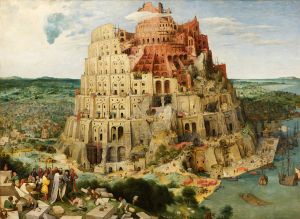Tower of Babel and Today
It is easy to view the stories of the Old Testament as ancient relics, distant from the realities of our current world and keep them on a shelf as colorful ancient ‘allegories’ to impart some meaning to the organization of the world. Far from that, these stories are profoundly relevant and are surely included in Scripture for the distinct purpose of advancing our understanding (ref: Romans 15:4). These are divine gifts of wisdom and they should be revered as such. This wisdom would keep the narcissism that infects our minds with the belief that the world is ‘more complicated today than it has ever been’ in check (Ecclesiastes 1:9). There is nothing new under Sun.
One of the most interesting stories in the Bible as it relates to society today happens to be among the oldest of the stories in the Bible. It is the story of the Tower of Babel. I heard Rabbi Daniel Lapin speak about The Tower of Babel and I have never looked at this story and our society the same. It has illuminated my view of humanity and seems to reveal the seminal point at which the disease of Materialism has ravaged our societies.
Nimrod was considered in the Jewish tradition a ‘hunter of men’ whose idea was to build a society to rival God. But more than rival God, it was to replace man’s need for God. Moreover, to advance a society to replace society’s and Man’s need for God, which is still relevant today as materialist leaders and thinkers of all stripes propose remedy after remedy to cure society’s ill at the expense of an individual’s reliance on his own pursuit and his own personal divine intermediary.
The key figure is Nimrod, who was considered a mighty hunter. Jewish tradition refers to Nimrod as a ‘hunter of men’. He was traditionally referred to as a mighty hunter in relation to his building of his kingdom. The name Nimrod comes from the ancient Hebrew verb marad, which is translated as rebel or ‘we will revolt’. The ‘hunter of men’ was a distinction of his will to power by trapping men through strategy and force.
Nimrod did not initially propose a tower. His call was; “Come, let us make bricks”. This call is vital to his society. Bricks are the same size and shape absent individuality. They have no variance in size nor do they possess a distinctive character. Prior to bricks, buildings were constructed of stone, each cut or naturally fitted with one another. Bricks are made by man and stones are made by God. Now, I am sure at this point the smirks might begin about why God hates bricks. This would miss the point. Replace the bricks with any new technology. It is the purpose and motives behind the use of such things and the presumption they would change or replace the ultimate questions of life, society and our relationship with God that is the troubling issue.
Individuality will be kept according to God’s will and we see this in the resulting scattering of languages and profound confusion. Individuals who are created in God’s image are not bricks. Individuals are not worker bees which are interchangeable.
But how were these bricks to be joined? They would be joined by mortar of course. The three consonants M, T, And R are used in the Hebrew word for mortar and according to Rabbi Daniel Lapin, a Prominent Rabbi, share a common root with the word for materialism.
What are we building today?
The EU building almost seems too similar to this prominent depiction of The Tower of Babel to be accidental.
Related articles
In the Midst of Our Sufferings
|
The Crazy Idea of Fasting in 2009
|
John Piper on Evil
|
Inherent righteousness / Imputed Righteousness
|















